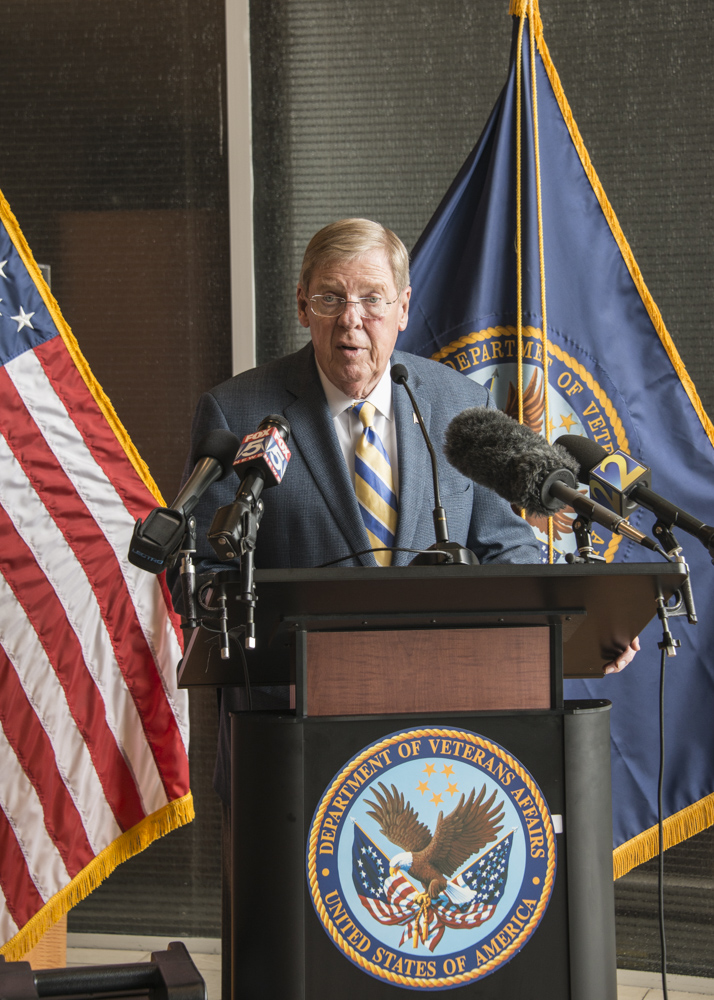
Johnny Isakson
ATHENS – A U.S. senator and a former senator traveled to the University of Georgia Friday to tout the benefits of political civility at a time extreme partisanship in Congress threatens to shut down the federal government.
Sen. Joe Manchin, D-W.Va., and former Sen. Roy Blunt, R-Mo., highlighted the first annual Johnny Isakson Symposium on Political Civility, held to honor the legacy of the late Georgia Republican senator Manchin called “the most civil public servant I’ve ever seen in my life.”
Isakson, who died nearly two years ago of Parkinson’s disease and other health issues, was widely respected as a voice of reason and compromise on Capitol Hill while other members of Congress were busy pushing partisan agendas that got in the way of achieving results.
Both Manchin and Blunt served with Isakson in the Senate. They, too, built reputations as moderates willing to work with members of both parties in pursuit of common ground on issues that needed addressing.
“He liked to get things done,” Blunt said of Isakson. “That takes a bipartisan approach.”
Manchin and Blunt gave the audience gathered at the UGA Chapel examples of legislation they worked to achieve that wouldn’t have happened without the bipartisanship only made possible by political civility.
For Manchin, it was the $1.2 trillion infrastructure spending bill Congress passed two years ago this month. He said he had to make deals with other lawmakers to get the measure through after 30 years without significant congressional action to improve the nation’s infrastructure.
“We had to work together,” he said. “You can’t let the perfect be the enemy of the good.”
For Blunt, it was increasing federal funding of the National Institute of Health (NIH) for the first time in a decade. He said it was only possible by getting Senate Democrats to agree to eliminate funding for 36 other NIH programs.
“You had to take funding from someplace to do this in a bipartisan way,” he said.
Manchin said Republicans and Democrats also worked together late last year to pass the Electoral Count Act clarifying that the role of the vice president in certifying presidential election results is purely ceremonial.
He said it was critical for Congress to do something following the Jan. 6, 2021, attack on the U.S. Capitol during the certification of Democrat Joe Biden’s electoral victory over incumbent Republican President Donald Trump.
“We knew we had a serious problem,” Manchin said. “We never wanted an insurrection to happen again.”
Blunt said the sharp partisanship now rampant in Congress isn’t just the lawmakers’ fault. He also blamed a political climate shaped by the media that has left Americans unable to see eye to eye on the most basic facts.
“Everybody wants to bring their facts to the table,” he said. “Everybody has their very narrow view of what’s going on.”
Both Manchin’s and Blunt’s brand of political civility is being lost to Congress. Blunt retired from the Senate earlier this year, and Manchin is about to leave. He announced Thursday his decision not to seek reelection in 2024, although he didn’t mention it during Friday’s symposium.
After retiring from Congress in 2019, Isakson founded the Isakson Initiative to raise awareness and funding for research related to neurological diseases. On Friday, Heath Garrett, who served as Isakson’s chief of staff, announced the initiative has raised more than $57 million.
John Isakson, the senator’s son, said the Isakson Symposium on Political Civility, will continue in the coming years at different sites around the country.